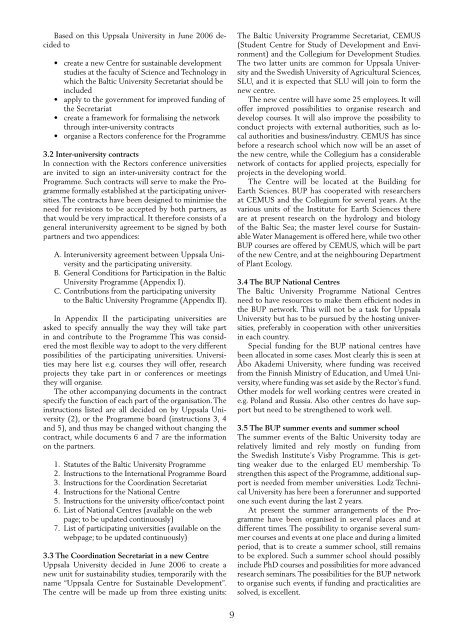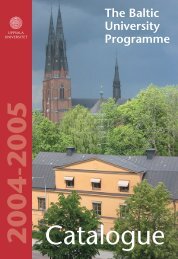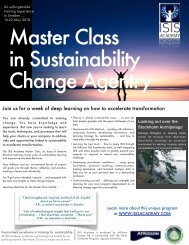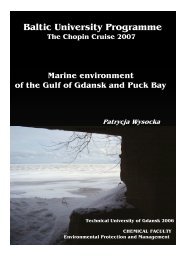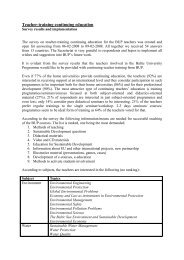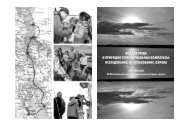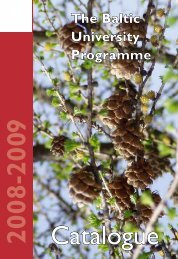Conference booklet - Baltic University Programme
Conference booklet - Baltic University Programme
Conference booklet - Baltic University Programme
Create successful ePaper yourself
Turn your PDF publications into a flip-book with our unique Google optimized e-Paper software.
Based on this Uppsala <strong>University</strong> in June 2006 decidedto• create a new Centre for sustainable developmentstudies at the faculty of Science and Technology inwhich the <strong>Baltic</strong> <strong>University</strong> Secretariat should beincluded• apply to the government for improved funding ofthe Secretariat• create a framework for formalising the networkthrough inter-university contracts• organise a Rectors conference for the <strong>Programme</strong>3.2 Inter-university contractsIn connection with the Rectors conference universitiesare invited to sign an inter-university contract for the<strong>Programme</strong>. Such contracts will serve to make the <strong>Programme</strong>formally established at the participating universities.The contracts have been designed to minimise theneed for revisions to be accepted by both partners, asthat would be very impractical. It therefore consists of ageneral interuniversity agreement to be signed by bothpartners and two appendices:A. Interuniversity agreement between Uppsala <strong>University</strong>and the participating university.B. General Conditions for Participation in the <strong>Baltic</strong><strong>University</strong> <strong>Programme</strong> (Appendix I).C. Contributions from the participating universityto the <strong>Baltic</strong> <strong>University</strong> <strong>Programme</strong> (Appendix II).In Appendix II the participating universities areasked to specify annually the way they will take partin and contribute to the <strong>Programme</strong> This was consideredthe most flexible way to adopt to the very differentpossibilities of the participating universities. Universitiesmay here list e.g. courses they will offer, researchprojects they take part in or conferences or meetingsthey will organise.The other accompanying documents in the contractspecify the function of each part of the organisation. Theinstructions listed are all decided on by Uppsala <strong>University</strong>(2), or the <strong>Programme</strong> board (instructions 3, 4and 5), and thus may be changed without changing thecontract, while documents 6 and 7 are the informationon the partners.1. Statutes of the <strong>Baltic</strong> <strong>University</strong> <strong>Programme</strong>2. Instructions to the International <strong>Programme</strong> Board3. Instructions for the Coordination Secretariat4. Instructions for the National Centre5. Instructions for the university office/contact point6. List of National Centres (available on the webpage; to be updated continuously)7. List of participating universities (available on thewebpage; to be updated continuously)3.3 The Coordination Secretariat in a new CentreUppsala <strong>University</strong> decided in June 2006 to create anew unit for sustainability studies, temporarily with thename “Uppsala Centre for Sustainable Development”.The centre will be made up from three existing units:The <strong>Baltic</strong> <strong>University</strong> <strong>Programme</strong> Secretariat, CEMUS(Student Centre for Study of Development and Environment)and the Collegium for Development Studies.The two latter units are common for Uppsala <strong>University</strong>and the Swedish <strong>University</strong> of Agricultural Sciences,SLU, and it is expected that SLU will join to form thenew centre.The new centre will have some 25 employees. It willoffer improved possibilities to organise research anddevelop courses. It will also improve the possibility toconduct projects with external authorities, such as localauthorities and business/industry. CEMUS has sincebefore a research school which now will be an asset ofthe new centre, while the Collegium has a considerablenetwork of contacts for applied projects, especially forprojects in the developing world.The Centre will be located at the Building forEarth Sciences. BUP has cooperated with researchersat CEMUS and the Collegium for several years. At thevarious units of the Institute for Earth Sciences thereare at present research on the hydrology and biologyof the <strong>Baltic</strong> Sea; the master level course for SustainableWater Management is offered here, while two otherBUP courses are offered by CEMUS, which will be partof the new Centre, and at the neighbouring Departmentof Plant Ecology.3.4 The BUP National CentresThe <strong>Baltic</strong> <strong>University</strong> <strong>Programme</strong> National Centresneed to have resources to make them efficient nodes inthe BUP network. This will not be a task for Uppsala<strong>University</strong> but has to be pursued by the hosting universities,preferably in cooperation with other universitiesin each country.Special funding for the BUP national centres havebeen allocated in some cases. Most clearly this is seen atÅbo Akademi <strong>University</strong>, where funding was receivedfrom the Finnish Ministry of Education, and Umeå <strong>University</strong>,where funding was set aside by the Rector’s fund.Other models for well working centres were created ine.g. Poland and Russia. Also other centres do have supportbut need to be strengthened to work well.3.5 The BUP summer events and summer schoolThe summer events of the <strong>Baltic</strong> <strong>University</strong> today arerelatively limited and rely mostly on funding fromthe Swedish Institute’s Visby <strong>Programme</strong>. This is gettingweaker due to the enlarged EU membership. Tostrengthen this aspect of the <strong>Programme</strong>, additional supportis needed from member universities. Lodz Technical<strong>University</strong> has here been a forerunner and supportedone such event during the last 2 years.At present the summer arrangements of the <strong>Programme</strong>have been organised in several places and atdifferent times. The possibility to organise several summercourses and events at one place and during a limitedperiod, that is to create a summer school, still remainsto be explored. Such a summer school should possiblyinclude PhD courses and possibilities for more advancedresearch seminars. The possibilities for the BUP networkto organise such events, if funding and practicalities aresolved, is excellent.


